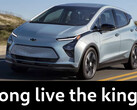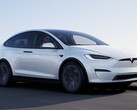1. Chevrolet Equinox EV
The Chevrolet Equinox EV will be a new addition to Chevrolet's EV lineup that is expected to land at some point between Q2 2023 and Q2 2024. The new Equinox SUV, which will start at US$30,000 for the 1LT trim that should arrive by Q2 2024, could see its price tag come down to an incredible US$22,500 for the base model for those who qualify for the US clean vehicle credit.
While the standard 1LT will offer a reasonable 250 miles of estimated range, stepping up to the 2LT or 2RS will net you 300 miles. You will also be able to trade some range for an eAWD option, making Chevrolet's new electric crossover SUV rather versatile and customisable.
2. Chevrolet Bolt EV (but not for long)
Chevrolet has announced that the Bolt EV will be discontinued at the end of 2023, despite its spot as one of the best, if not the best, value EVs on the market. Starting at just US$27,495 for the 1LT base model with 259 miles of range, a full US$7,500 tax incentive will bring the Bolt down to just under US$20,000, which is a fair bit cheaper than a lot of ICE vehicles.
Aside from its long legs, the Bolt EV is a fairly basic vehicle — you get what you pay for — but it does feature fast charging that will get you up to 100 miles in 30 minutes. Additionally, the Bolt EV has a sensible interior layout, with just enough tech to remind you that you're driving an EV, but not enough to actually present a safety hazard when performing simple tasks.
3. Volkswagen ID.4
The Volkswagen ID.4 is a bit of an odd mix that ultimately ends up presenting a decent value at MSRP, despite the range numbers lacking somewhat. Starting at US$38,995 (US$31,495 after the US$7,500 credit its eligible for), the Standard RWD ID.4 gets you 209 miles of EPA-rated range. It's only when you decide to spend US$43,995 (US$36,495 after the tax credit) on the ID.4 Pro that you get 275 miles of range.
The ID.4 Pro starts to look rather expensive, but it compares well to vehicles like the Standard Range Tesla Model 3 (which comes in at US$36,490 after tax credits). If you're looking for something in the price range of something like the Model 3, but you want to avoid Tesla, or you're looking for a slightly larger vehicle, the ID.4 Pro might serve you well.
Buy the Autel Home Smart Electric Vehicle (EV) Level 2 Charger on Amazon.
Source(s)
Chevrolet (1, 2), Volkswagen, US Department of Energy, Tesla














